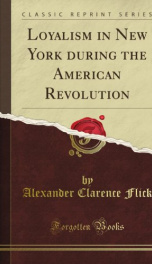loyalism in new york during the american revolution

CHAPTER IRISE OF THE LOYALIST PARTYLOYALISM, as believed and practiced during the American revolution, had both a religious and a political side. It was based upon the fundamental teachings of Anglicanism, which made loyalty to the ruler and obedience to law re-ligious duties.1 This did not mean abject submission to acts looked upon as blunders, or as being unjust. It was not " non-resistance and passive obedience/' for none upheld and used with more telling effect than the loyalists the sacred right of petition and remonstrance. Only when the issue came to be one between submission to the will of the king and parliament, as expressed in law, and resistance by rebellion or revolution, did religious duty enforce obedience. The political science of Anglicanism was, therefore, a fundamental principle in loyalism.1 Dr. Myles Cooper, the President of King's College and the recognized clerical leader of the loyalists in 1774, set forth this phase of loyalism best. God, he said, estaTable of Contents CONTENTS; CHAPTER I Rise of the Loyalist Party; tlGES; The religious and political side of loyalism-The loyalists were Americans, not Englishmen-The origin of the loyalist party-Officialism as a factor in loyalism-The " Leislerians " and the "Aristocrats "-The development of the colonial social-political groups-Zenger's trial, King's College controversy and the Stamp Act as party factors-Party changes from 1770 to 1774-The Continental Congress completes the organization of the loyalist party-The character and classes of loyalists 9; CHAPTER II Final Organization of the Loyalist Party; Loyalist opposition to the Continental Congress-Efforts of the last general assembly for peace-The Provincial Convention opposed by the loyalists-Effect of Lexington on the loyalist cause-Work of the committee of one hundred-The general association made a test of the loyalists' position-The loyalists oppose t
Info about the book
Author:
Series:
Unknown
ISBN:
1113810645
Rating:
3/5 (3)Your rating:
0/5
Languge:
English
Users who have this book
Users who want this book
What readers are saying
What do you think? Write your own comment on this book!
write a commentif you like loyalism in new york during the american revolution try:
Other books by this author
Do you want to exchange books? It’s EASY!
Get registered and find other users who want to give their favourite books to good hands!


